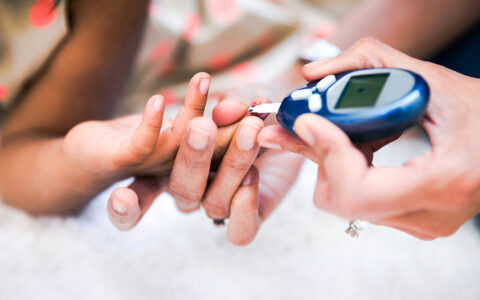Teenagers often struggle to handle diabetes self-care, yet a new behavior-change program focuses attention not on the teens themselves, but on their mothers.
“During adolescence, there’s a handoff of responsibility from mothers to children for managing the illness,” said Sarah Jaser, Ph.D., director of pediatric psychology, an associate professor of pediatrics at Vanderbilt University Medical Center, and first author of article outlining a trial of the program. “The transition often leads to problems with diabetes management and an increase in family conflict.”
The program teaches adaptive ways for mothers to nurture their own mental health, such as taking occasional time out for leisure, and introduces more positive ways of interacting with their children. Known as Communication and Coping, the program falls in line with Jaser’s previous efforts to find practical approaches for families whose child has been diagnosed with type 1 diabetes.
Avoiding Lifelong Damage
Glycemic instability markedly raises risks for patients with type 1 diabetes, including posing a risk of severe long-term complications, such as blindness and cardiovascular disease. Nevertheless, with their adult brains still under development, teenagers often find it hard to stay on top of diabetes-related tasks. Situations ranging from stresses at school to peer pressure at parties can prompt teens to forget about glycemic control.
Another factor found to create higher risk is being cared for by a mother with poorly controlled depression.
Randomized Controlled Trial
The program trial involved 154 English-speaking dyads consisting of a mother or female caregiver and an adolescent, ages 11 to 17 years, with a type 1 diabetes diagnosis for at least a year.
Each of the pairs must have been living together at least 50 percent of the time. All the mothers reported either mild or moderate depression as measured by a widely used questionnaire.
“We randomized the dyads to one of two conditions: either Communication and Coping or a diabetes-education group that served as the control,” Jaser explained.
Phones and Facebook
All mothers were given a large binder filled with information relevant to their assigned group. The mothers in both groups participated in phone calls of between 10 and 60 minutes that were held one-on-one with a trained interventionist to discuss the information provided.
In addition, the mothers were assigned to private Facebook groups that delivered a post per day for three months correlated with the topics covered in their calls.
“The mothers could post their own content on Facebook and interact with others in their particular group,” Jaser said.
Mothers in the diabetes-education group, for example, received materials about diabetes management – topics such as traveling with diabetes and treating hypoglycemia – and went on to discuss those topics with their interventionists and in their Facebook group.
Thoughts Behind the Emotions
“For mothers in the Communication and Coping group, the interventionists take a cognitive behavioral therapy approach to help moms identify their stressors and most troubling associated thoughts,” Jaser said. “They learn to identify the ‘hot thoughts’ that drive emotions underneath.”
“The interventionists take a cognitive behavioral therapy approach to help moms identify their stressors and most troubling associated thoughts.”
The mothers in the Communication and Coping group were able to move beyond feelings of stress or anxiety by learning to uncover the thoughts that had sparked the emotions and ways to challenge those thoughts when needed.
Facing Worry More Calmly
For example, a mother who was several minutes late to pick her child up after school might experience a variety of thoughts and feelings, Jaser explained. She might worry about her child’s loneliness during the wait or what other parents might think of her. Such patterns of thinking lead to mental distress.
Different people will have different thoughts that trigger negative emotions. In the program, the mothers learn to identify and disrupt that pattern by reframing their internal responses, she said.
“They learn to ask themselves, ‘Is my worrying now helping me be a better parent or helping my child?’”
The previous scenario might have played out differently for a mom following the Communication and Coping approach. Anxiety and negativity might have been avoided if she alters her thoughts to imagine her child managing well in the late pick-up situation and reminds herself that most people are understanding about occasional slip-ups.
Still, Jaser acknowledges that it’s normal for parents to worry about a potential health crisis or even the early death of their children.
“It’s not totally unrealistic, but also not as likely as they think. They learn to ask themselves, ‘Is my worrying now helping me be a better parent or helping my child?’”
Changing the Subject
One complaint from teens with type 1 diabetes is their parent’s focus excessively on their condition.
“Kids often say, ‘My diabetes is all my mom ever asks me about,’” Jaser noted. “We challenge the moms in the experimental arm to ask about other things and also to plan enjoyable ways to spend time with their child.”
For one family, that might mean an all-day outing; for another, a 15-minute walk in the neighborhood or trying a new recipe together.
Early Signs of Success
“At this point, we’re collecting 12-month follow-up data, and we expect to have the full results by winter,” Jaser said.
They’ve also been collecting anecdotal evidence from mothers who have completed the research team’s satisfaction survey regarding the Communication and Coping program.
Jaser said she has heard mostly positive remarks from participants.
“Mothers wrote things like, ‘It introduced me to things I wouldn’t have thought about in regards to communicating with my child,’ and ‘Great connecting with others on Facebook who also have a child with diabetes.’”
Ninety-three percent of the survey respondents said that they would recommend the Communication and Coping program to other mothers of children who have diabetes.






